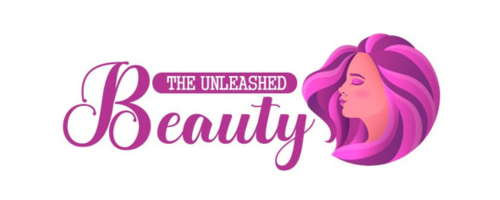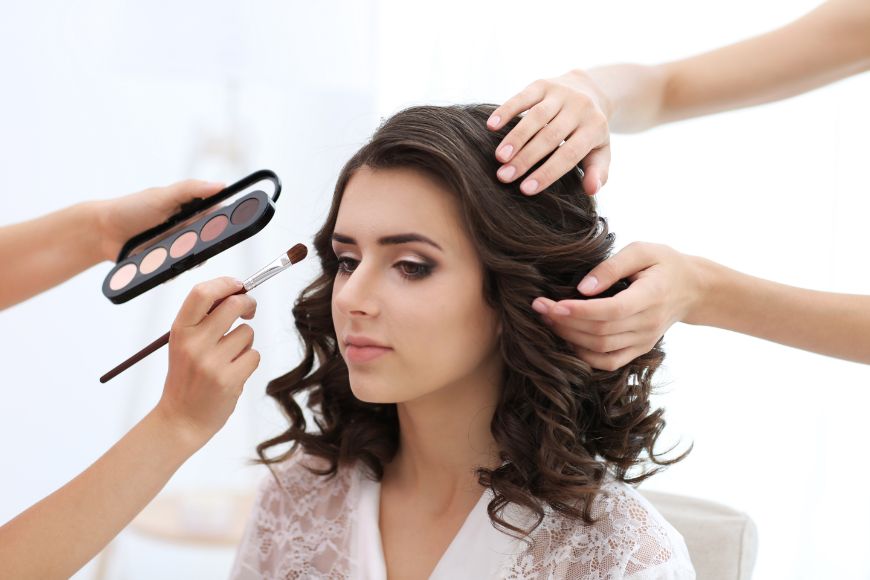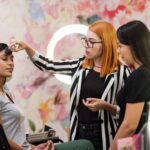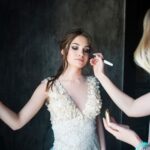A consideration in how to become a makeup artist is building those habits that will ensure the happiness and welfare of your clients. But to grow a successful and long-term makeup business the health and safety of both you and your client should remain front of mind at all times. Doing so will mean that good practice will swiftly become those good habits and you’ll be able to operate safely without constantly worrying about it.
So what should you be thinking about?
1. Avoid Cross Contamination
One of the biggest things to be aware of is cross contamination. It is so important to use clean makeup brushes, dispose of (disposable) mascara wands, keep your hands clean etc.
This goes both ways. A polite reminder to your client to inform you of any infections such as such as Conjunctivitis, cold sores, shingles, impetigo, boils or sties can help you manage the risk. These conditions are contagious, could contaminate your entire kit, or worse – mean you infect others. If your client is suffering from any of these things makeup should be avoided and if it is a trial it can be moved to a later date. If your client is a bride suffering from these things on their wedding day ask them to provide their own makeup and you can use disposable tools so as not to cross contaminate.
If you are suffering from any of these conditions take great care as to not use any of your tools or makeup from your kit. Do not touch your face or the infected area while with your bride and most importantly carry your hand sanitizer with you at all times and use it frequently.
2. Keep your kit clean
After every client you must wash your makeup brushes. Carry a makeup brush cleanser or use soap & hot water to thoroughly cleanse the face.
Some things can’t be cleaned very easily such as eye-shadows and blushers (though you can use a spray on alcohol that dries quickly to try and sanitize them). However, you can cleanse your lipsticks, eye-liners and lip liners by simply using a hot, wet cotton pad and wiping down the lipstick, taking off the first layer of colour.
To clean your pencil tools such as liners for eyes and lips simply use a pencil sharpener and it will sharpen it, taking away the first layer.
3. Keep in mind your kits lifespan
Your kit won’t last forever. This is important to remember. Your lipsticks, glosses, cream shadows, cream liners, mascaras, foundations and concealers will eventually expire. Most of them have a year lifespan before they need to be replaced. Be vigilant. Old makeup can cause skin reactions on clients.
Powder makeup such as blushers, powders, eye-shadows etc. can virtually last forever as they are not liquid based and therefore don’t require preservatives to keep them fresh. Just keep the clean with alcohol. This will also keep them oil free – oil from the skin can be transferred to the pressed powders, discolouring them and making them hard to use.
4. Exercise extreme caution when using heated tools
One of the biggest dangers in doing hair and makeup is using heated tools, where the consequences of human error can be significantly magnified. It is important therefore to take your time in curling, straightening and blow-drying hair. Paying close attention and slowing down can mean you are less likely to send a burned and blistered bride walking down the aisle
5. NEVER touch the dress
You are a makeup and hair artist and not a seamstress, dresser or stylist. Stick to what you know. If the bride asks you to help sew, steam or iron anything, politely decline and explain that unfortunately you are terrible at ‘all of the above’ and it wouldn’t be wise for you to try your hand at it.
The reason for declining is because if anything were to happen to the dress. e.g. you burn it, tear it, stain it, rip it. You will be held liable and could very well be asked to pay for it. It’s best to stay clear and do not offer advice on how to fix a dress, get rid of wrinkles etc. Anything you say could be held against you if something goes wrong.
I have learnt from painful experience the risks of not heeding this rule – having left an assistant behind to move to a second client I received a call about thirty minutes later to learn that the assistant had managed to burn the dress with an iron. Words cannot express what a terrible day that was…
6. Get Insured
Insurance is the next part of your kit that you must think about. Not only to protect yourself but to protect your tools and your clients. If anything were to happen that was in or out of your control, you need your insurance.
Are you training to become an MUA? How do you feel about health and safety? Maybe you’re already working – if so what do you do each day to make sure you’re operating safely? Have you got any tips on avoiding health and safety disasters? I’d love to hear them! Drop me a comment below, leave a message on Facebook



